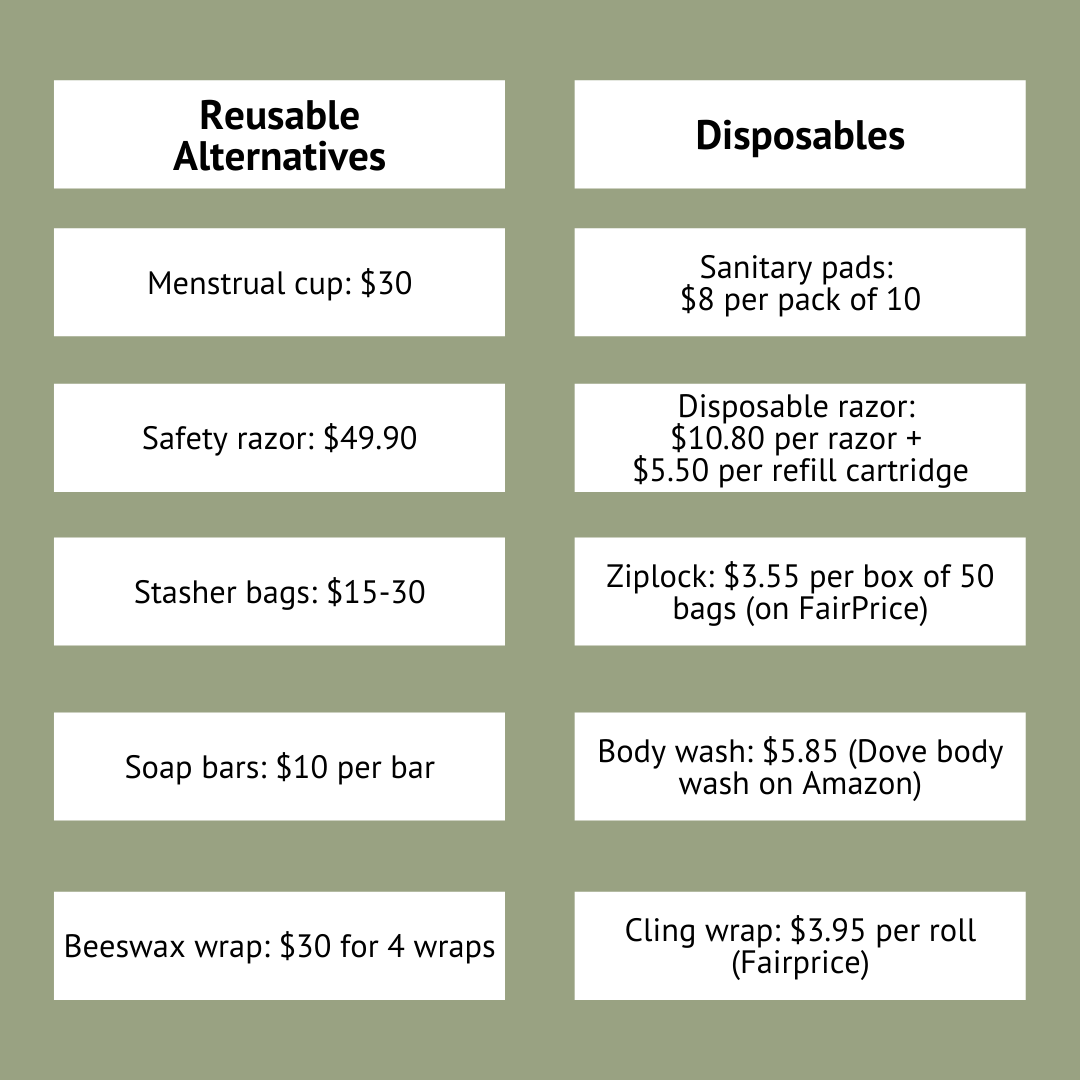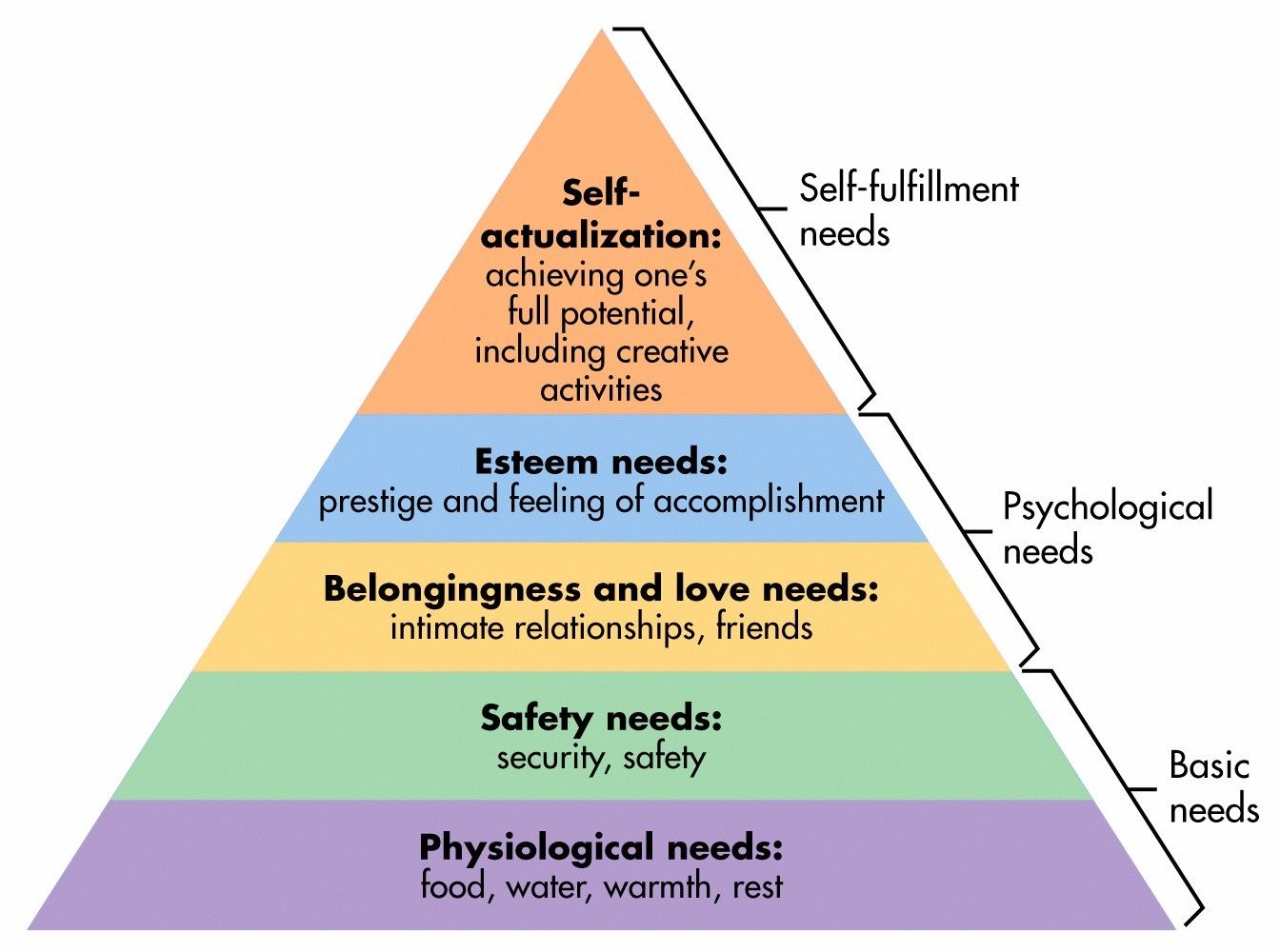When I first got interested in sustainability, the first thing I did was to assess my current lifestyle habits, identify areas where I’m using unnecessary disposables, and switch to reusables where possible.
This meant replacing my disposable razors for a safety razor, sanitary pads for a menstrual cup, zip-lock bags to silicone bags, cling wrap to beeswax wrap, and more. And while I felt good about myself after, my wallet definitely did not share that sentiment.
This begs the question – is the sustainability movement only for those who can afford it?
The cost of “shopping green”
To assess the cost of going green, I took a look at some of the products I feel were most pertinent in my own journey and how much they cost online. Below are just some of the items I now use on a regular basis in replacement of disposables or items that are generally viewed as “less green”.
As a point of comparison, I’ve also included the typical price of the items they are meant to replace.

At first glance, the upfront cost of reusables definitely seems to be exponentially steeper. However, the upside to reusables is in its namesake — they can be used time and time again. Over time, most of these items should pay for themselves as long as they are properly cared for.
For instance, a menstrual cup from Freedom Cups costs $33 while sanitary pads from popular brand Kotex cost approximately $5.20 per pack of 16 (day pads) on Lazada. In one cycle, a woman goes through an average of 12-16 pads. For convenience sake, let’s take it that a woman will go through one pack per cycle; this will add up to approximately $30 within six months. Thus, even though menstrual cups cost more upfront, using them for a mere year will more than compensate for the cost. Considering that menstrual cups can last for up to 10 years if properly cared for, the reusable alternative in this situation is definitely the more economical choice.
Admittedly, the upside of some products are more obscure than others. For instance, a set of 4 beeswax wraps cost $30 on Amazon, whereas an entire roll of cling wrap costs only $3.95 in FairPrice. The lifespan of a beeswax wrap is definitely nowhere as long as that of a menstrual cup, and it’ll require regular maintenance to upkeep the layer of beeswax coating on the cloth — all of which will add to its overall cost.
In such cases, it is possible that simply using the disposable option will be more economical. However, I justify my choices with the reasoning that I use such products often, and thus, it is still worth the money in the long run. Beyond that, I confess that there is some element of virtue-signalling; there’s a need to prove to myself and others that I am doing my part for the greater good, and using these products are a visible representation of my efforts.
Regardless, there are some who will stay away from the reusable alternative (even if it makes financial sense in the long run) simply due to the upfront cost. This is especially prevalent in those who are less financially-savvy or less financially stable. Why so?
Well, a few factors can come into play.
Why not buy green?
Maslow’s hierarchy of needs
First off, Maslow’s hierarchy of needs can explain the decision-making differential. Maslow’s hierarchy of needs is a motivational theory in psychology that depicts five levels of human needs (physiological, safety, love, esteem, and self-actualisation) in a hierarchical manner. Based on the theory, needs at the base of the hierarchy has to be satisfied before individuals attend to the needs higher up.

Thus, according to the theory, those who are less well-off will have to first fulfill their need for safety (financial security) before moving on to larger social concerns like that of climate change.
Difficulties in upfront payment
While long-term savings might make sense to most, some might have difficulties paying a higher cost upfront to begin with. Individuals with a lower income might have to dedicate a large proportion of their income to their basic necessities (such as rental, housing loans, food, etc.).
As a result, it’ll be difficult to pay more for an item that is a non-essential, even if it means greater cost savings in the long run. Ultimately, current urgent needs will have to take priority over potential long-term perks.
So is sustainability just for the rich?
Most definitely not!
After all, going green isn’t just about purchasing reusable items. It is also about the typical refrains of consuming less, purchasing second-hand, repairing instead of replacing, and using items for as long as possible, among others.
While carrying items like Stojo cups or metal straws are trendy at the moment, it’s important to still keep in mind the message that these products stemmed from — to reduce our reliance on disposables and reuse items whenever possible. Oftentimes, this doesn’t require purchasing specialty products. For instance, before purchasing a collapsible silicone lunchbox, perhaps you can save on the extra expense and use a tupperware container that you have at home instead.
I’ll be the first to admit that some of the items I purchased are not necessarily out of the goodness of my heart. When I first learned about sustainability, I hopped on board the trend without much research, and was excited at the thought of being able to buy new, aesthetic items that are supposedly more environmentally-friendly. With more research, I slowly learned that going green isn’t about shopping green at all. Rather, it’s about shopping less.
Can we make sustainability accessible for all?
I would say the answer is a resounding yes. All we have to do is look beyond our capitalist tendencies of consumerism and realise that “shopping green” is just one tiny facet of sustainability. There are other ways to go green that include huge cost savings upfront such as thrifting, taking public transport instead of driving, reducing food waste, and so on.
As I find myself armed with my metal straws, I realise that I am not at all the sustainability warrior I thought I was.
But I’m learning. And I hope this helps you as well. There are some products that I still swear by (menstrual cups and safety razors being two of them), but there are also some that I think we could have all done without.
Being sustainable is not about being trendy — this is what I tell myself now when I feel the temptation to buy that Christmas-edition reusable tumbler Starbucks is advertising, or that fancy insulated lunch box to replace my plain ole’ tupperware.
Instead, it’s about making the conscious decision to choose the more environmentally-friendly alternative in all aspects of our lives. And this, at the very least, is absolutely free.
Join the conversations on THG’s Facebook and Instagram, and get the latest updates via Telegram.












